Lake City Tables Medical Marijuana Moratorium Councilwoman Moses: "I need more information"
Posted December 20, 2016 08:45 am | (1 comment)
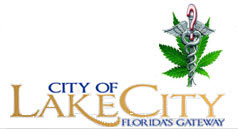 COLUMBIA COUNTY/LAKE CITY, FL –
Last night, after hearing from the public
and all City Council members except
Councilman Eugene Jefferson, the City
Council tabled the consideration of its
medicinal marijuana dispensary moratorium.
Councilwoman Melinda Moses told the Council,
"I need more information." The Mayor and the
rest of the Council members agreed.
COLUMBIA COUNTY/LAKE CITY, FL –
Last night, after hearing from the public
and all City Council members except
Councilman Eugene Jefferson, the City
Council tabled the consideration of its
medicinal marijuana dispensary moratorium.
Councilwoman Melinda Moses told the Council,
"I need more information." The Mayor and the
rest of the Council members agreed.
"People that need the medicine – need the medicine"
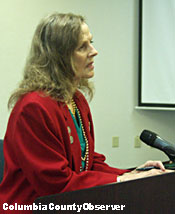
Retired pharmacist Sandra Buck-Camp
Lake City resident and retired pharmacist Sandra Buck-Camp was the first to address the Council on the moratorium.
She told the Council, "I'm here as a professional, as well as a caregiver for someone who has need for medical marijuana. If we have an opportunity to obtain medical marijuana through a physician's prescription I think the opportunity needs to be presented to residents. The thought of having to try to get it out of town or seek alternatives sources -- I don't like the concept and I don't like not taking responsibility for our patients here in Columbia County and in Lake City."
Ms. Buck-Camp concluded, "If there is a potential for a moratorium -- don't do it -- people that need the medicine need the medicine."
After Ms. Buck-Camp's remarks, it was pointed out the City Manager's agenda omitted the required public hearing on the marijuana moratorium ordinance.
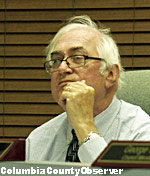
Mayor Steve Witt always gives the public its
turn and listens.
Mayor Witt said not to worry, he would let anybody speak.
City Attorney Fred Koberlein read the ordinance title.
Your reporter, a Columbia County resident, pointed out that the people of Florida, Columbia County, and Lake City voted overwhelmingly to approve the constitutional amendment allowing the sale of medicinal marijuana.
It was also pointed out that Lake City has its own police force for which residents pay extra. It would be expected that the police department could handle whatever issues came its way regarding the dispensing of medical marijuana and that the issues pointed out in the ordinance such as "offensive odors, trespassing, theft, fire hazards, increased crime, robberies, nuisance problems, and increased DUI incidents," were mostly bogus issues.
Later on in the discussion, City Attorney Koberlein explained that medical marijuana is not smoked.
Amendment 2 is not about Reefer Madness
Columbia County resident Ralph Kitchens told the Council that he thought the City should have a laissez-faire approach and that "Reefer Madness," the film released in 1936, had nothing to do with the Constitutional Amendment. He asked, "Do you think people are not going to smoke cannabis because of your moratorium? You've got to be kiddin' me."
Mr. Kitchens finished his presentation and the Mayor asked for a motion to adopt the ordinance.
The City Council
There was silence.
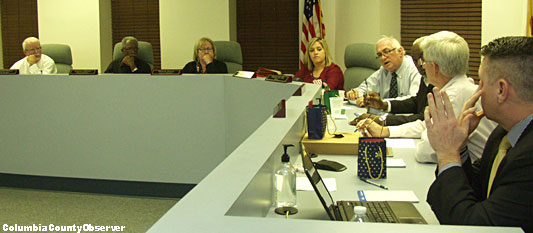
The City Council addresses the ordinance.
Mayor Witt (facing the camera) solicited
comments from the public and Council. Here
he addresses the need for a workshop.
The Mayor asked, "Does anybody want to make a motion one way or the other?"
There was more silence.
Mayor Witt asked, "Do you want to table it?"
There was more silence
Mayor Witt added, "Do you want to table it till January?"
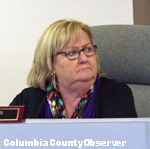
Councilwoman Moses put on the brakes. "I
need more information."
After another pause, Councilwoman Melinda Moses spoke up, "I think I would. I need more information about the law and what's expected of us from the state and all of that."
Mayor Witt followed up, "That's my opinion... I don't think this is going to happen in the next month. We can do a little research."
Councilman Hill said he also would like to find out more about it.
Councilman Ward added, "I'd like to see what the state is going to do about it."
Mr. Ward didn't want to see the City enact regulations that would be negated by the state.
Mayor Witt agreed.
City Manager Johnson Weighs In
City Manager Johnson advised that the "City is already having requests for information regarding our land-use and zoning laws regulating these kinds of activities... There is no land-use code. There is no zoning code to regulate anything to do with a dispensary of this nature."
Mr. Johnson continued, "My constituents (sic) in other cities and counties throughout the states where I follow those things -- many of them have already passed moratoriums."
City Manager Johnson said that the only reason he supported the moratorium was to give the City time to investigate and make reasonable regulations.
He concluded, "That's it. Nothing more. It's not to keep Ralph from smoking his dope if he wants to."
Councilwoman Moses said, "I want to do it right."
City Attorney Koberlein
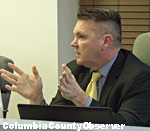
Attorney Fred Koberlein mixed his opinions
with the law.
Mr. Koberlein told the Council, "Currently, dispensing cannabis is legal -- it's been legal... A business can open up on a corner anywhere it likes in the municipal limits... All marijuana under the law in Florida is smokeless... Only a licensed grower may open a dispensary... The Department of Health is charged with setting up rules and regulations within six months of January... We don't know what the department of health is going to do."
Mr. Koberlein gave his opinions of the current six licensed growers in Florida, claiming that he has been "lobbied hard by every one of them."
Mr. Koberlein suggested that the Council have a workshop to explore the issues.
He told the Council, "If you don't do anything, then you've made an educated decision... If somebody applies tomorrow and they start dispensing, it's not going to be smoking pot."
At the conclusion of Mr. Koberlein's lengthy remarks, Mayor Witt said he would like to have a workshop.
Adjusting the City Agenda to Fit Koberlein's Schedule
Different times were proposed. Mr. Koberlein had to check his schedule, something former City Attorney Herbert Darby never had to do.
While Mr. Koberlein was checking his schedule, Mayor Witt mentioned that a moratorium wouldn't have to be six months, but it could be "three months or whatever we wanted to do."
Mr. Koberlein said that he had a LSHA meeting at 5:15 on January 9 and thought it would be safe for him to meet at the City at 6 pm until he realized the Authority had scheduled a workshop for that night.
Mayor Witt offered to move the scheduled time of the January 9 City workshop to 6:30 to accommodate Mr. Koberlein.
January 10 was also a conflicted date.
Mr. Koberlein suggested having the workshop before the scheduled January 17 meeting, which accommodated his schedule.
The Council approved the January 17, 5 pm marijuana moratorium workshop and tabled the first reading of the moratorium ordinance until 6 pm, following the workshop.
Mayor Witt said that if the Council needed more time after the workshop, "We'll table it again."
